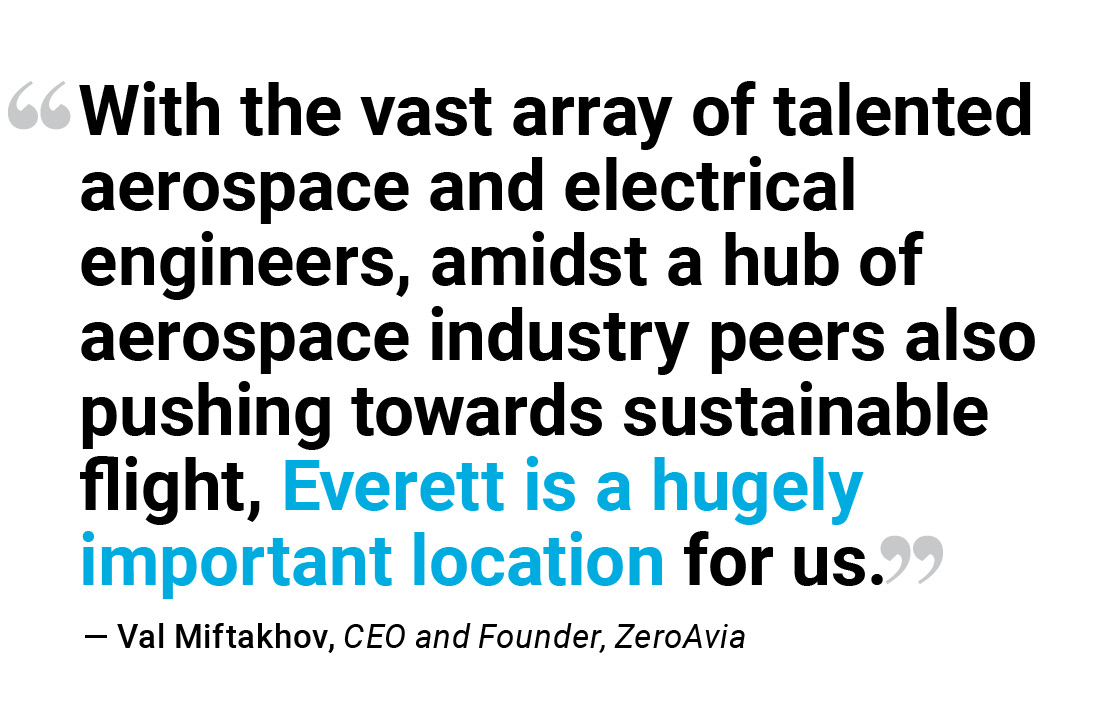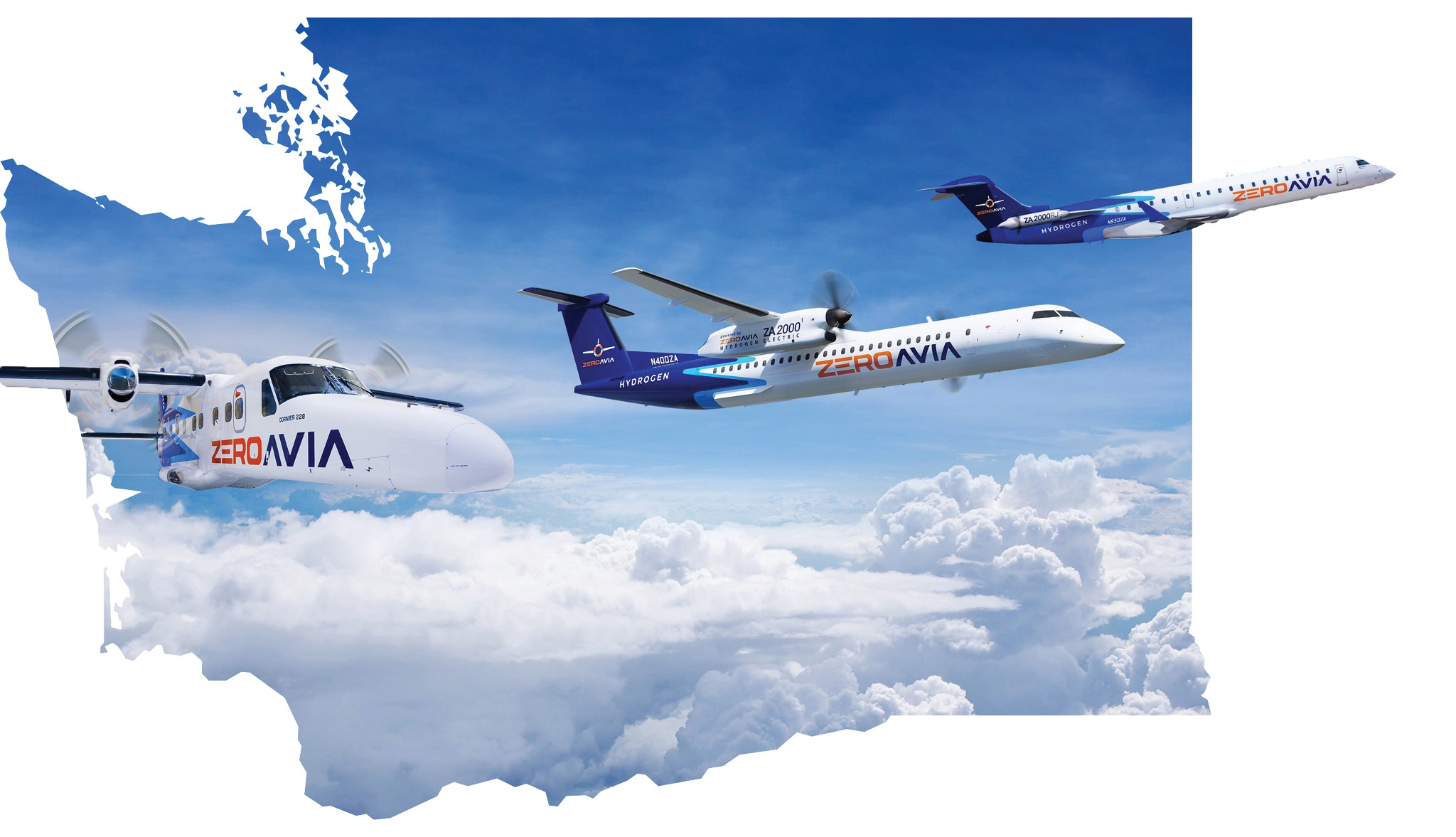AeroDynamic Advisory, a leading aerospace consulting firm, has named Washington the most competitive state in the country for manufacturing and assembling aerospace structures and aircraft. Its Aerospace Competitive Economic (ACES) 2022 study also highlights states’ aerospace clusters, or concentrations of aerospace-related industrial activity. Washington’s can be found in King, Pierce and Snohomish Counties anchored by Boeing’s commercial aircraft plants in Renton, Everett, Fredericksburg and Auburn and their many suppliers.
Washington State Department of Commerce counts more than 130,000 workers in the state’s aerospace industry, which generates about $70 billion in economic impact annually. The Greater Seattle area alone hosts more than 900 aerospace companies that employ nearly 100,000 people. Let’s not forget space companies. Blue Origin (engine assembly at its headquarters in Kent), SpaceX (satellite production in Redmond), Black Sky (geospatial intelligence in Seattle) and AeroJet Rocketdyne (propulsion systems in Redmond) are among the more than 90 space companies with operations in Greater Seattle.
AeroDynamic Advisory’s ACES 2022 report ranks states based on 41 metrics that are organized into eight weighted categories: Costs (20%), Labor & Education (17.5%), Taxes & Incentives (17.5%), Aerospace Industry (15%), Infrastructure (15%), Economy (5%), Research & Innovation (5%) and Risk to Operations (5%). Washington ranked first in the nation in the Labor & Innovation category, third nationally in Aerospace Industry and Research & Innovation, sixth in Risk to Operations and Economy and seventh in Taxes. The state also ranks competitively in several individual metrics, including first in labor productivity and insurance losses, third in energy costs and fourth in port volume, GDP per capita and manufacturing tax. The ACES 2022 report marks the third time Washington has ranked first overall in recent years.
Emission-Free Air Travel on the Horizon
In July, Twelve, a company that turns carbon dioxide into fuels among other things, broke ground in Lake Moses on a facility for producing its E-Jet fuel, a sustainable aviation fuel (SAF). Co-founder and CEO Nicholas Flanders said in a statement that commercial-scale production of E-Jet brings the company a step closer to “creating a world run on air.”

Why Washington? Flanders said the state “is the perfect location for our facility, with its abundant renewable energy resources to power our carbon transformation process and longstanding global leadership in the aviation industry.” Alaska Airlines, which operates a hub in Seattle, will be among the first users of fuel from the new plant.
Governor Jay Inslee has taken several steps in recent months to make sure Washington is not just known for its commercial aircraft and space industry sectors. He wants clean aviation fuel production to be a hallmark of the state’s aerospace industry. In May, he signed climate legislation that included a measure to incentivize SAF use by up to $2 per gallon.
In June, at the Paris Air Show, the governor announced an investment from the state to support ZeroAvia’s expansion at Paine Field in Everett. The company makes hydrogen-electric engines for aircraft that produce no emissions. It will retrofit engines of existing aircraft, making their use by airlines and others zero-emission. ZeroAvia signed a deal in June with Air Cahana, based in Los Angeles, for 250 of its ZA2000 engines that the airline will use on turboprop aircraft. Similarly, Surcar Airlines, a new carrier in the Canary Islands, will use the company’s ZA600 engines on its Twin Otter seaplanes when the engines are available.
ZeroAvia plans to have hydrogen-electric engines commercially available for aircraft seating nine to 19 passengers travelling up to 300 nautical miles in 2025, with models for larger aircraft seating more passengers and travelling thousands of nautical miles available in future years.
At the Paris Air Show event announcing the state’s support for the company’s investment in Everett, ZeroAvia CEO and Founder Val Miftakhov explained the significance of locating the engine plant in Washington: “With the vast array of talented aerospace and electrical engineers, amidst a hub of aerospace industry peers also pushing towards sustainable flight, Everett is a hugely important location for us,” he said. “The support from Governor Inslee and the Washington Department of Commerce enables us to push forward quickly on our targets for commercial flight of up to 20-seat aircraft by 2025, and up to 80-seat aircraft by 2027. We are tremendously excited about the opportunities this opens up to grow our team and establish world class facilities at Paine Field.”
On October 23, Spokane-based American Aerospace Materials was designated as the U.S. tech hub for aerospace materials manufacturing by the U.S. Senate. Nearly 200 regions competed for this honor, which now puts Spokane in the running for at least $50 million in federal funding through the CHIPS & Science Act.

